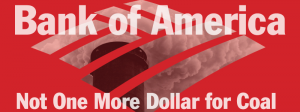 Sponsoring local community events is a tried and true PR maneuver for corporate polluters who otherwise would find it hard to get much sympathy from the communities they’re poisoning.
Sponsoring local community events is a tried and true PR maneuver for corporate polluters who otherwise would find it hard to get much sympathy from the communities they’re poisoning.
Bank of America may not be directly involved in business operations that cause pollution, but it is certainly bankrolling them. And so it seems the Bank of Coal is sponsoring the Chicago marathon this weekend — but that sponsorship doesn’t come anywhere close to making up for the damage done to the environment of Chicago or the health of Chicagoans by the coal plants Bank of America is funding.
Here’s what’s really ironic about this situation: While you can easily imagine why Bank of America would want to sponsor a health-oriented event such as the Chicago marathon, the race route goes right by the Fisk coal-fired power plant. Bank of America, the largest funder of coal projects in the US, provided nearly $70 million to the company that owns the Fisk and Crawford coal-fired power plants — which together are responsible for the pollution that causes the deaths of 42 Chicagoans every year.
Sponsorship FAIL.
Here’s our full press release on this bitterly ironic state of affairs:
Rainforest Action Network finds Bank of America Contributes Millions to Chicago’s Dirtiest Coal Plants
Marathon Sponsor Accused of Financing Pollution of Chicago’s AirCHICAGO—This weekend when 45,000 runners join the Bank of America-funded Chicago marathon, the route will take them past one of the city’s dirtiest and most controversial coal plants, the Midwest Generation Fisk plant, which is also financed by the bank. The environmental group Rainforest Action Network has found that just last year Bank of America provided $66 million in financing to Edison International and its subsidiary Midwest Generation.
Bank of America last week touted a company-funded report by the University of Illinois’ Regional Economics Applications Laboratory that estimated that the annual marathon event produced $171.5 million in business activity. However, this number barely makes up for the cost of hidden health damages from Chicago’s coal plants, which according to a report released by the Environmental Law and Policy Center have reached around $127 million per year.
“While Bank of America is touting the economic benefits of its marathon sponsorship, its core business practices are causing a drag on Chicago’s public health and the economy. The Bank of America marathon should be about supporting physical health and Chicago’s future. Sadly, as the lead financier of Chicago’s toxic coal plants, Bank of America is doing far more to keep the city’s air polluted, asthma rates up and coal plants standing,” said Amanda Starbuck, energy and finance program director for the Rainforest Action Network.
Chicago is the only major metropolitan area with not only one, but two polluting coal plants within the city limits. The Fisk and Crawford plants, both owned by Midwest Generation and financed by Bank of America, are located in the Pilsen and Little Village neighborhoods. This weekend’s marathon will run right by the Fisk plant in Pilsen.
Coal fired power plants kill between 13,000 and 34,000 people a year–as many as one person every 15 minutes. That staggering figure includes the 42 Chicagoans who die as a result of pollution from Fisk and Crawford. According to a report from the Clean Air Task Force, residents are at risk for heart disease, cancer, and respiratory illness because of pollution from these plants.
“Sponsoring marathons and funding billboard ads is Wall Street’s failed model for good corporate citizenship. Our standards for what the country needs from banks is much higher. Now more than ever, we need banks like Bank of America to showleadership in protecting the health of our economy and our communities,” continued Starbuck.
In addition to the toxic pollution, coal fired power plants are the biggest single source of global warming pollution in the United States, which will cause sea level rise and extreme weather, as well as droughts and lower crop yields. Together, Fisk and Crawford generate about 18 times the emissions of O’Hare airport’s ground operations and equal two-thirds of the CO2 emissions generated by all modes of transportation in Chicago.